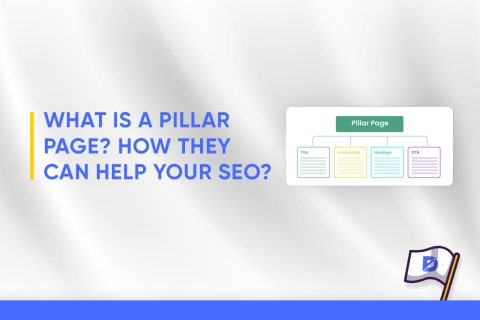SEO must be the main focus for every website owner to increase visibility and credibility on Google and other search engines. It is a fact that SEO and keywords are inseparable parts. When it comes to choosing and using keywords in online content creation, several factors should be considered. One of these factors is determining the appropriate number of keywords to target per page. Today’s main questions come. What is the best number of SEO keywords for a single page?
First, we’ll briefly introduce keywords and their two main types: Branded and non-branded keywords. Second, we’ll answer, “Why do keywords play a vital role?” Third, we’ll emphasize the number of keywords for any SEO strategy and list eight reasons to use fewer keywords. At the end of our guide, you will see different techniques to find the best keywords for your website. If you’re ready, the journey is starting!
What Are Keywords?
Keywords are the words or phrases entered by internet users into the search bar of search engines to find what they are looking for. To satisfy their users, Google and other search engines use these keywords to find the most relevant content from millions of web pages.
Let’s give an example. For example, you are looking to buy a new pair of shoes for walking. All you have to do is go to Google.com or any other search engine you use and type in a search query that directs you directly to sites that sell shoes. In our example, you might use keywords, such as “walking shoes,” “comfortable walking shoes,” or “women’s walking shoes,” etc., in their search query on Google. These keywords allow Google and other search engines to understand what you are looking for and help you find websites that sell walking shoes.
Branded Keywords vs. Non-branded Keywords
The keywords you can use can be categorized into two topics: Branded and non-branded.

Branded Keywords
Refers to keywords that include the name of a company or its brand. For example, you type “buy Nike shoes” into the search query on Google. Nike is a brand name in the search query, making it a branded keyword. We can increase examples, such as “Starbucks mocha” or “Microsoft software,” Branded keywords can also contain the brand’s specific product or service, such as “iPod music” or “Amazon Kindle.” Branded keywords have a lot of benefits, including:
- Improving your brand recognition: You can improve the visibility and credibility of your brand in the eyes of target customers.
- Targeted traffic and more sales: Using branded keywords can drive highly targeted traffic because users who search for a specific brand or its products tend to be more focused on purchasing.
- Increased brand loyalty: You can also increase brand loyalty among your current customers because these keywords make it more convenient for them to find and buy the products or services they already know.
- Higher brand reputation: A popular presence on Google can also help your brand’s overall reputation and, in return, create strong consumer trust.
While there are many benefits to using branded keywords, the most critical disadvantage is that they get low search volume and only target users familiar with the brand or its products. Therefore, if you want to expand your reach and attract the attention of new customers, you may need more than branded keywords.
Non-branded Keywords
Refers to words or phrases that do not include any name of a company or brand. Instead, they describe a product or service in a general sense. For example, you want to purchase a new pair of shoes again. In this case, non-branded keywords can be “comfortable shoes” or “walking shoes.” Or “fast food,” “burgers,” “french fries,” or “quick meals” are the keywords McDonald’s can use. These keywords are generally used by users who have not yet committed to a specific brand. There are many advantages of using non-branded keywords, including:
- Wider audience: Targeting non-branded keywords help you reach a larger audience searching for a product or service similar to what you produce but don’t have a particular brand in mind.
- Improving visibility: you can also increase your website visibility in SERPs by reaching more users and driving more traffic to your web pages.
- Discovering customer needs: Non-branded keywords offer an opportunity to gain insight into what your target customers are searching for on the web.
Although non-branded keywords have a lot of benefits, there are also some disadvantages. The most important one is that since these keywords are more general and attract a larger audience, there is more competition, making it more difficult to get higher rankings on Google.
Why Do Keywords Play A Vital Role?
We all know the importance of SEO, right? It allows you to increase the visibility and accessibility of your website and web pages in search engine result pages (SERPs). When you optimize the web pages, you can be ranked higher, and, in return, you can get more organic traffic. Optimizing your website presence can result in a boost in visibility and credibility, which directly improve the overall success of your business. At this point, SEO can’t live without keywords; it is impossible. This is because when you use a relevant keyword, it tells Google what your content and web pages are about. However, if you don’t use any keywords, Google can’t understand your content. So, you can’t be ranked higher on the first pages of Google.
Three Steps of Search Engines
To make it easier to understand, we want to focus on the importance of keywords in SEO. We would like to zoom in on three steps for a natural process in any SEO strategy.

- Crawling: Involves sending out robots, also called crawlers or spiders, by search engines to find new and recent content.
- Indexing: The storage and arrangement of the content discovered during the crawling phase.
- Ranking: Providing the content that will offer the most accurate response to a searcher’s inquiry, with results arranged from most appropriate to least relevant.
All these steps focus on keywords to find, understand and rank the content. Correctly used keywords enable you to complete these steps successfully.
Note that search engines can’t read content or look at a photo as we do. Instead, they look at keywords to understand what the content is about. You must use keywords on your site to communicate effectively with search engines. These words assist Google in identifying your webpage’s relevance and quality, which affects your position in search results.
The Best Number of Keywords for Your SEO Strategy
Everything has an “optimal” frequency. So, a critical question arises. What is the recommended number of SEO keywords target that should be included on a webpage to reach optimal search engine visibility?
For optimal results, we recommend targeting a single keyword per page and including three variations of that keyword within the content. Each page should revolve around a specific topic, with the main keywords related to the content. Regarding the number of keywords to target, selecting one to three per page is good as a general tactic.
It is advisable to focus on a single primary keyword for each page. While it’s possible to aim for three to five keywords on a single page, choosing one keyword will be better as the primary focus. Even though the main focus should be on the primary keyword, secondary keywords can also play an essential role in shaping the content. By using them in subheadings and the corresponding paragraphs, you can create distinct sections within your content. However, don’t forget that optimizing the rest of the article for the primary keyword is crucial.
Types of Keywords
There are two main types of keywords to get more traffic; primary keywords and secondary keywords.

Primary Keywords
The primary keywords for a webpage or content are the central topics and main focus areas. These keywords are generally the most crucial search phrases users use to find that content. So, you intend to rank highly for these keywords in the search engine results pages (SERPs).
Secondary Keywords
Secondary keywords are words or phrases associated with and enhance the primary keyword, although they are not the primary focus of the content. These keywords provide additional information and depth to the content and can help drive more search traffic. In other words, they act as supporting keywords that help the primary keyword to rank better in SERPs.
Keyword Usage Example
Let’s assume you manage a website offering a wide selection of shoes and creating a product page for a specific type of basketball shoe, such as Nike Air Jordan. In this scenario, the primary keyword for the page would be “Nike Air Jordan,” as it is the main product being presented and the most commonly searched term users would use to find this particular product. In addition to the primary keyword, you could include various secondary keywords related to the product, right? They could include “Nike shoes,” “basketball shoes,” “high-quality shoes,” or “breathable/comfortable shoes.” By targeting these keywords, you can provide additional information and details about your products while broadening the search terms for which your page may rank.
To optimize your online store, we recommend to focus on one primary keyword like “Nike Air Jordan,” along with two or three related secondary keyword variations like “high-top basketball shoes” or “best basketball shoes.”
Keyword Intensity in SEO
Keyword intensity, also known as keyword density, can be defined as a metric used in search engine optimization to measure the frequency of a specific keyword or phrase on a web page with the total number of words. It is calculated by determining how many times the keyword or phrase appears on the page, then dividing that number by the total number of words on the page. So, this calculation results in a percentage representing the page’s keyword density.
Let’s say a target keyword is “digital marketing,” and it appears five times in a 500-word article. To calculate the keyword density, we would divide the number of times the keyword appears (5) by the total number of words in the article (500) and then multiply the result by 100. This would give us a keyword density of 1%, which means that the target keyword “digital marketing” makes up 1% of the total words on the page.
It’s often recommended to aim for a keyword density of 1 or 2 for every 100 words, which typically refers to a keyword density of 1-2%. However, it’s important to note that excessive keyword usage, or keyword stuffing, can result in a penalty from Google and others. To avoid this, it’s recommended to keep the keyword density within certain limits based on the level of competition for the keyword. A lower density of 5-6% is suggested for highly competitive keywords, while a slightly higher density of 8-10% may be acceptable for less competitive keywords. Rather than focusing solely on keyword density, it’s essential to prioritize creating high-quality content that naturally and effectively incorporates relevant keywords and phrases. Ultimately, search engines aim to provide users with the most relevant and valuable content, so creating high-quality content that meets these criteria should be the primary goal.
Why Should We Use Fewer Keywords?
You should concentrate on fewer SEO keywords targeted on your web pages for several reasons. Now, we would like to examine the reasons.
- Less is better: By concentrating on fewer keywords, you can guarantee that the content on your page is straightforward, clear, and focus-oriented.
- Search engine preferences: Google prefers web pages optimized effectively for a limited number of keywords instead of those containing many irrelevant keywords.
- Easier observation process: With fewer keywords to keep track of, monitoring and evaluating your search engine ranking progress becomes more manageable, allowing you to make efficient decisions about your future optimization plans.
- Better user experience: Web pages optimized excessively for too many keywords can become messy and challenging to navigate, resulting in a poor user experience.
- More relevance: If the content on your pages is highly relevant to specific and has fewer keywords, you can offer significant value to people searching for those particular words or phrases.
- Improving targeting: By limiting your focus to fewer keywords, you can reach specific users and niches, resulting in a higher likelihood of conversions and a greater return on investment.
- Keyword stuffing: If a web page has been optimized with too many keywords, it may give off a spam-like or low-quality appearance, harming the trust and credibility it holds with users and search engines.
- Higher Click-Through Rates: Web pages optimized with limited keywords usually have a higher click-through rate (CTR) since they are more relevant to user searches and create a better user experience.
How To Find Keywords
A new question arises: How can you find the most relevant keywords? Of course, you might have some keyword ideas for your SEO strategy, but you may need to be sure of their suitability. This is where keyword research comes into play. However, don’t worry; easy and quick research can help you find appropriate and more keyword ideas. You can use numerous methods to do this, but the simplest one is using a keyword research tool.

Keyword Research Tools – SEO Tools
Keyword research and SEO tools have similar functions. You enter a broad term related to your business or industry and wait for the tool to generate relevant keyword suggestions. These tools provide a search volume of keywords used in your business field. Currently, several keyword research tools are available on the web. Google Keyword Planner, Moz Keyword Explorer, Semrush, Ahrefs Keyword Generator, and Long Tail Pro are some well-known ones. You can create a keyword research checklist to track your strategy.
Target Audience Research
Understanding and gaining insight into the needs, wants, behaviors, preferences, and characteristics of your target audience can help you discover the right keywords and phrases they are using to search for a product or service like yours. So, using these keywords in your pages’ content helps you improve your rankings, visibility, and credibility in search results and attract the attention of your target market. Moreover, target audience research can allow you to determine the tone, style, and type of content searched by your target audience.
Competitor analysis
By examining the content of your competitor’s websites, you can identify the keywords they are targeting to drive traffic. To achieve this, you can use keyword research tools like Moz, Ahrefs, or SEMrush. These tools can provide valuable data on which keywords attract the most traffic to your competitors’ websites, enabling you to detect potentially profitable keywords for your content.
Brainstorming
The brainstorming process involves contemplating your business or content topic and determining a list of appropriate terms or phrases that come to mind. It would help if you focused on the products or services you offer, as well as the challenges you try to solve and the benefits you provide to your target visitors. At the end of the day, you can generate a comprehensive list of potential website keywords.
To Sum Up
We all know the importance of SEO and keywords, and it is clear that the right SEO keywords target higher rankings in SERPs. In our guide, we tried to answer the optimal number of keywords you should use on each page. You should use a single primary keyword, the most relevant search term, and secondary keywords that support the primary keyword with related terms. Various methods are available to find the keywords for your SEO strategy, including utilizing keyword research tools, analyzing the target audience, evaluating competitors, and brainstorming. However, in any case, you should keep the number of keywords you use to a minimum point: Use the minimum number of most effective keywords as possible to meet search engine preferences, provide a better user experience, avoid keyword stuffing, and easily track your rankings in search results.
Frequently Asked Questions About
Keywords are the terms or expressions users type into search engines to find what they seek. Including these keywords on your website can improve your visibility and credibility on Google, drive more organic traffic, and help search engines understand the content on your site.
Yes, having excessive keywords on a single page has a negative impact. It is considered a spammy method by Google and other search engines. Too many keywords make the content difficult to read and understand.
Keyword stuffing refers to the trick of loading a webpage with too many keywords to manipulate search engine results. However, this tactic is considered an ineffective and low-quality SEO.
If you effectively research and choose keywords, you can increase the visibility and rankings of your website. Besides, the right keywords make driving and engaging the target audience easier.
Keyword density is the percentage of times the keyword or phrase is used on the page. This can be calculated by dividing the total number of times the keyword or phrase is used by the total number of words on the page and multiplying by 100.





No comments to show.